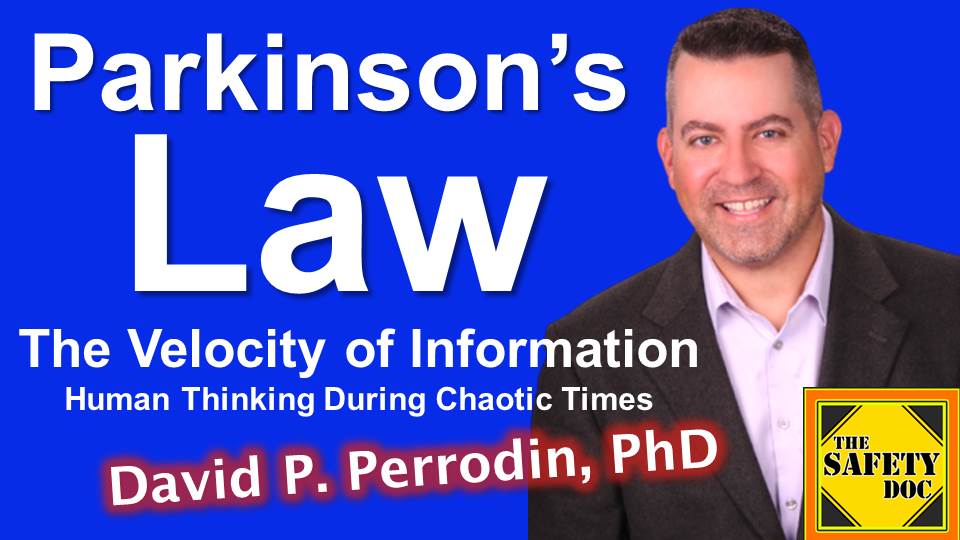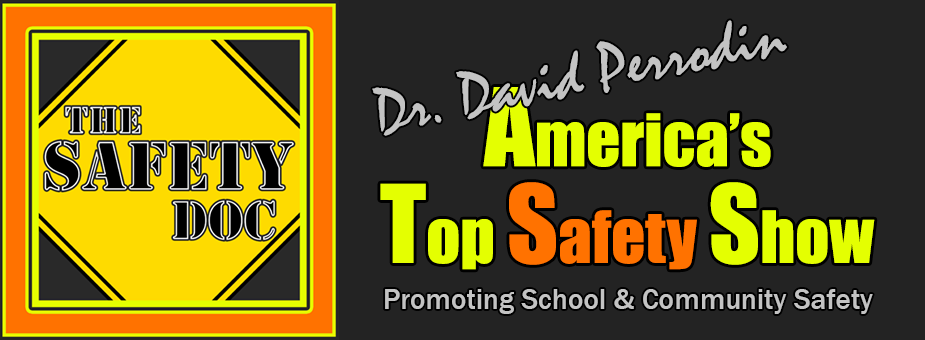Breaking Parkinson’s Law in Chicago | The Velocity of Information | David P. Perrodin | SDP175
[Podcast] Remember fiddling around until the final hour to hunker down and complete an assignment for school or a project for work – even though you knew of the deadline for weeks? There you were, confident you could serviceably complete the task and submit it in a nick of time. Welcome to Parkinson’s Law!

DIRECT LINK to MP3 of this Episode: https://tinyurl.com/SDP175-AUDIO
WHAT IS PARKINSON’S LAW? Parkinson’s Law is the adage that work will expand to fill the time allotted for its completion. The term was first coined by Cyril Northcote Parkinson in a humorous essay he wrote for “The Economist” in 1955. If someone has 5 hours to rake leaves from a yard – and apprises that task of clearing the small yard might take, at most, 2 hours, the tendency – per Parkinson’s Law, is for the person to take the full 5 hours to rake the leaves. They might rake at a slower pace, take frequent breaks, walk around to assess their progress, adjust their gloves, hat and jacket, and so on.
NEW DEFINITION OF PARKINSON’S LAW. In his book The Velocity of Information: Human Thinking During Chaotic Times, Doc postulates a second interpretation of Parkinson’s Law. In this take, Parkinson’s Law represents the ingrained need for humans to have a distinct ritualistic start and end routine to their work days. He wrote about this in his book, centering on a business owner in Chicago who found people knocking on his door (a closed non-essential virtual reality gaming business), to inquire about renting a table for a few hours – so they could unfold their laptops and “got to work.”
BREAKING PARKINSON’S LAW IN CHICAGO. The following is an excerpt (pages 75-76) from the book The Velocity of Information: Human Thinking During Chaotic Times by David P. Perrodin. “Prior to 2020, Aaron Sawyer’s Redline VR, a virtual reality club and bar in the Ravenswood neighborhood of Chicago, was doing great business. His mega-computers, 3D game configurations, and 360-degree immersive goggles and haptic wearables were something that people could not get at home. He offered the best zombie-battling experience in the city. So much so that Sawyer considered opening a second location (1). Then the pandemic hit. Chicago city government started deciding which businesses were “essential,” and thus allowed to operate, and which were not. Redline VR was not deemed “essential.” Under Mayor Lori Lightfoot’s plan, Redline VR was allowed to reopen in phase four (2) at 25 percent capacity. There was no phase five. There was no revenue coming into the business. So Sawyer pivoted. Again and again (3) Parkinson’s Law states that “work expands so as to fill the time available for its completion (4).” Linda Stone, the consultant who has studied attention behavior, found that during the pandemic, people were checking work emails “at all hours of the night,” as their homes became their workplace (5). At the outset of the pandemic, many people left their office on a Friday, began working remotely the following Monday, and did not return to their offices. Many still have no return date in sight, and a significant number of positions have become permanently remote. Getting out of the home, and into an office setting, became an attractive option for some people. At home, the roles of spouse and mother and caregiver all intersect with the workday. Work now fills the physical space once reserved for family and relaxation. The mind is not always able to differentiate between the two.”
REMOTE WORKERS WANTED A PLACE TO GO TO WORK. In May and June 2020, Aaron Sawyer observed an uptick in people asking if they could rent his VR stations, which were similar to work cubicles, for a few hours or for a day. “Redline VR rebranded to offer rented office space, at just fifteen dollars for the day. Curtains and separators were put up so people could keep their social distance and have a work space of their own, away from home and family.”

CITATIONS. (1) Aaron Sawyer, interview with the author, August 14, 2020; (2) City of Chicago. “Reopening Chicago.” City of Chicago. 2020. https://www.chicago .gov /city /en /sites /COVID -19 /home /reopening -chicago .html; (3) Sawyer, interview with the author; (4) Parkinson, Cyril Northcote. Parkinson’s Law [And Other Studies in Administration] (Cambridge, MA: The Riverside Press, 1957), 3. http://sas2 .elte .hu /tg /ptorv /Parkinson -s-Law.pdf; (5) Linda Stone, personal communication with the author, August 14, 2020.
This is episode 175 of The Safety Doc Podcast published on 03-29-2022. This podcast and blog post represent the opinions of David P. Perrodin and his guests to the show. The content here is for informational purposes only. Please consult with your safety professional regarding the unique needs of yourself or your organization.
FOLLOW
- Watch this episode on “The Safety Doc” YouTube channel https://tinyurl.com/SDP175-VIDEO
- Listen to this episode on PodBean MP3 https://tinyurl.com/SDP175-AUDIO
- Apple Podcasts http://tinyurl.com/SafetyDocApplePodcasts
- SAFETY DOC WEBSITE & BLOG safetyphd.com
- Follow David & The Safety Doc Podcast on Twitter @SafetyPhD
- Email Dr. Perrodin thesafetydoc@gmail.com
Purchase Dr. Perrodin’s books
School of Errors – Rethinking School Safety in America
The Velocity of Information – Human Thinking During Chaotic Times
